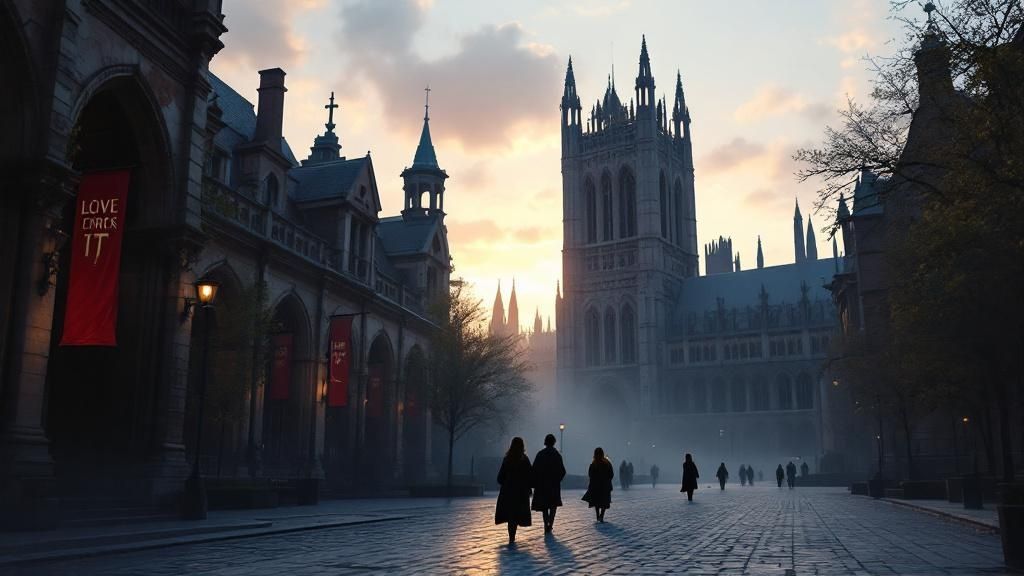Create Your Own AI Girlfriend 😈
Chat with AI Luvr's today or make your own! Receive images, audio messages, and much more! 🔥
4.5 stars

Getting Started
Every grand adventure begins with a single, powerful idea. For writers, the spark that ignites an entire world of magic, heroes, and villains is often the most elusive element. This article is built to provide that spark. We have curated a comprehensive list of actionable fantasy story prompts, designed to move beyond generic concepts and give you a solid foundation for your next narrative. Each entry is more than just a one-sentence idea; it's a launchpad complete with potential plot twists, character archetypes, and world-building suggestions to get your creativity flowing immediately.
Whether you are plotting an epic quest, a dark descent into monstrosity, or a tale of magic hidden within our own world, these prompts offer specific and practical starting points. We will explore scenarios ranging from reluctant heroes and magical academies to lost heirs reclaiming their thrones. The goal is to bypass the blank page and dive directly into crafting compelling characters and intricate plots. Forget vague notions and endless brainstorming. This guide provides the concrete building blocks you need to construct a unique and memorable fantasy saga, helping you transform a simple premise into a fully-realized story. Let's explore the concepts that will define your next great work.
1. The Chosen One's Reluctant Journey
The "Chosen One" is a cornerstone of epic fantasy, a timeless archetype that continues to captivate readers. This fantasy story prompt centers on an ordinary individual who discovers they possess a unique power or are destined to fulfill a world-saving prophecy. The core conflict often arises from their initial reluctance. They might be a simple farmhand, a cynical city dweller, or a quiet scholar who never asked for greatness, making their forced transformation into a hero all the more compelling.
This trope is deeply rooted in myth, popularized by Joseph Campbell's "Hero's Journey" and masterfully executed in works like J.R.R. Tolkien's The Lord of the Rings with Frodo Baggins or J.K. Rowling's Harry Potter. The audience connects with the protagonist's humanity, their fear, and their self-doubt, making their eventual acceptance of the quest a powerful moment of character growth. It’s an effective prompt because it provides a clear central conflict and a natural arc for your protagonist.
How to Make This Prompt Your Own
While the "Chosen One" is a classic, you can inject fresh life into it by subverting expectations. The key is to explore the why behind the reluctance and the how of their journey.
- Make the "Gift" a Curse: Frame the prophecy or power not as a blessing but as a terrible burden. Perhaps the magic slowly drains their life force, isolates them from loved ones, or forces them to make impossible moral choices. This adds a layer of tragic depth to their journey.
- Focus on Agency: Your protagonist shouldn't be a passive pawn of destiny. Give them clear moments where they can reject the call, and show the tangible consequences of their choices. Their decision to finally accept their role should be an active, hard-won choice, not a resigned surrender.
- Introduce a Flawed Prophecy: What if the prophecy is wrong, misinterpreted, or a deliberate lie created by a manipulative force? Your hero might discover they aren't the chosen one at all, or that there are multiple "chosen ones" competing for the title, creating intrigue and uncertainty.
- Explore the Aftermath: Consider what happens after the dark lord is defeated. The "chosen one" trope often ends with victory, but the psychological toll of saving the world could be a fascinating story in itself.
2. Portal Fantasy - Ordinary Person in Magical World
A classic for a reason, the portal fantasy is a powerful story prompt that thrusts a character from our familiar, mundane world into a realm of magic and wonder. The central conflict stems from this stark contrast. Your protagonist must navigate bizarre customs, incomprehensible magic, and dangerous creatures, all while dealing with the fundamental human desire to find a way back home. This immediate fish-out-of-water scenario provides a natural source of tension, wonder, and character development.

This prompt serves as a perfect vehicle for world-building, as the reader discovers the new world through the fresh, relatable eyes of the protagonist. It was popularized by timeless tales like C.S. Lewis's The Chronicles of Narnia and Lewis Carroll's Alice's Adventures in Wonderland. The effectiveness of this fantasy story prompt lies in its ability to ground the most fantastical elements in a relatable human experience, making the magic feel more tangible and the stakes more personal.
How to Make This Prompt Your Own
The portal fantasy framework is incredibly flexible. The key to a modern and compelling take is to focus on the details of the transition and the protagonist's unique reaction to their new reality.
- Make Mundane Skills Matter: Give your protagonist a skill from their normal life that becomes surprisingly vital in the fantasy world. A chemist might be able to debunk "potions" or create explosives, an accountant could decipher a kingdom's failing economy, or a paramedic could apply modern first aid that seems like healing magic.
- Establish Clear Portal Rules: The portal itself can be a source of conflict. Is it a one-way trip? Does it open and close on a schedule? Perhaps it requires a specific key or a sacrifice to operate. Defining how the portal works creates immediate goals and obstacles for your character beyond just surviving the new world.
- Create Complicating Relationships: The desire to go home can be powerfully challenged by the new connections the protagonist forms. A deep friendship, a burgeoning romance, or a sense of responsibility for a cause in the new world can create a powerful internal conflict, forcing them to choose between the life they knew and the one they've found.
- Explore the "Why": Why was this specific person brought to this world? It might not be a grand prophecy. Perhaps it was an accident, a kidnapping, or they were summoned by a desperate faction for a very specific, non-heroic reason. This subverts the "chosen one" expectation that can often overlap with this trope.
3. Magic School Academy Setting
The magic school is a beloved and enduring subgenre, offering a rich environment for character-driven stories. This fantasy story prompt places the narrative within an institution dedicated to teaching magic, where young protagonists must navigate academic rivalries, arcane exams, and the universal challenges of growing up. The enclosed, structured setting provides a perfect microcosm of the wider world, allowing personal stakes to escalate into world-threatening conflicts.

This trope provides a natural framework for mystery, adventure, and coming-of-age tales. It was powerfully established by Ursula K. Le Guin's A Wizard of Earthsea and catapulted into global phenomenon status by J.K. Rowling's Harry Potter series. More modern, adult-oriented takes like Lev Grossman's The Magicians and Patrick Rothfuss's The Name of the Wind show its versatility. The appeal lies in the relatable blend of the mundane (homework, social cliques) and the magnificent (casting spells, uncovering ancient conspiracies), making the fantasy elements feel grounded and accessible.
How to Make This Prompt Your Own
While the magic school is a familiar concept, its true potential lies in creating a unique institution with its own distinct culture and rules. Move beyond the standard European-style castle and explore new possibilities.
- Create Unique Magical Disciplines: Instead of generic elemental magic, develop specialized subjects. Imagine classes on Chrono-cartography (mapping time), Aetheric Engineering (building magical constructs), or Somatic Linguistics (casting spells through dance or gesture). This immediately makes your world feel fresh.
- Develop a Distinctive School Culture: Is your academy a rigid military institution, a liberal arts college for mages, a secretive monastery, or a cutthroat corporate training ground? The school's philosophy will dictate everything from teaching methods to student life and the types of conflicts that arise.
- Introduce Diverse Magical Traditions: Don't have every student learn the same way. Perhaps some students come from families practicing forbidden blood magic, while others use nature-based shamanism or tech-infused spellcraft. This creates inherent conflict and diverse perspectives on what magic is and how it should be used.
- Focus on the "Why" of the Education: What is the ultimate purpose of this academy? Is it training mages to fight a prophesied war, to serve the empire, to push the boundaries of magical research, or simply to prevent untrained magic-users from accidentally destroying reality? The school's mission statement provides a strong central theme for your story.
4. Dark Fantasy - Hero Becomes the Monster
This morally complex prompt forces a protagonist, who starts with heroic intentions, down a dark path. They may gradually adopt the methods of their enemies, embrace forbidden powers to achieve their goals, or discover that the cost of victory is their own humanity. This descent into villainy explores potent themes of corruption, moral ambiguity, and the seductive nature of power, making for a truly gripping narrative.
The tragic hero is a powerful archetype found in classical literature and powerfully revitalized in modern dark fantasy. Works like Joe Abercrombie's The First Law trilogy, with characters like Logen Ninefingers, or the iconic fall of Anakin Skywalker in Star Wars, showcase this descent masterfully. The core appeal of these fantasy story prompts lies in their gut-wrenching relatability; readers witness a good person make a series of understandable, yet horrifying, choices that lead to their ruin.
How to Make This Prompt Your Own
The key to a successful "hero becomes the monster" arc is making the fall believable and tragic, not sudden or nonsensical. The journey, not just the destination, is what captivates the audience.
- Justify the Fall: The hero’s motivations must be strong and understandable. Are they trying to save a loved one at any cost? Are they trying to bring order to a chaotic world through extreme measures? Their initial goals should be noble, making their slide into darkness all the more tragic.
- Show, Don't Tell, the Corruption: The transformation should be gradual. Show the small compromises first. A white lie, a necessary cruelty, a "one-time" use of dark magic. Each step should feel like a logical, if regrettable, choice in the moment, allowing the corruption to creep in slowly until it's too late.
- Use Moments of Self-Awareness: Let your protagonist have moments where they recognize what they are becoming. These instances of internal struggle, regret, or even self-loathing make the character more complex and sympathetic. Do they push these feelings down, or do they try to change course and fail?
- Define the Point of No Return: Identify the specific act that solidifies their transformation. This is the moment they cross a moral line from which they cannot retreat. Making this event impactful and a direct consequence of their previous choices provides a powerful climax to their character arc.
5. Lost Heir Reclaiming Their Kingdom
The "Lost Heir" narrative is a powerful and enduring fantasy story prompt, tapping into themes of destiny, justice, and identity. This story centers on a protagonist, often living in obscurity or ignorance of their lineage, who discovers they are the rightful heir to a throne. Their kingdom has been usurped, and they must embark on a perilous quest to gather allies, prove their legitimacy, and challenge the current regime to reclaim their birthright.
This archetype is a staple of classic and modern fantasy, seen in Aragorn’s journey in The Lord of the Rings and the various claimants in George R.R. Martin's A Song of Ice and Fire. The appeal lies in the underdog dynamic and the personal growth required for the protagonist to transform from an ordinary person into a worthy ruler. The prompt provides a clear goal-driven plot: reclaim the kingdom, making it an excellent framework for an epic tale of adventure and political intrigue.
How to Make This Prompt Your Own
While the "Lost Heir" is a well-trodden path, you can create a unique and memorable story by challenging the core assumptions of the trope. The key is to explore what it truly means to rule and what separates a legitimate monarch from a deserving one.
- Earn the Crown, Don't Inherit It: Move beyond the idea that bloodline alone grants the right to rule. Your protagonist should have to prove their worth not just through battle, but through wisdom, compassion, and leadership. Show why they would be a better ruler than the usurper, forcing them to earn the people's loyalty.
- A Sympathetic Usurper: Create a complex antagonist. Perhaps the usurper seized power to end a civil war started by the "rightful" king's family, or maybe they brought prosperity and stability to a kingdom that was failing under the old regime. This creates a powerful moral dilemma for your hero and the kingdom's citizens.
- Explore the Cost of Power: Reclaiming a kingdom is rarely a clean process. Force your protagonist to confront the bloody consequences of their quest. They may have to sacrifice innocent lives, betray allies, or compromise their own morals to win the throne, questioning whether the crown is worth the price.
- The Flawed Legacy: What if the protagonist’s ancestors were tyrants? Your hero might discover their family was rightfully deposed. They must then decide whether to restore a tainted legacy or forge a new, better path for the kingdom, one that rejects their own history.
6. Quest for a Magical Artifact
The "Quest for a Magical Artifact" is a foundational plot in fantasy, driving heroes across vast landscapes in search of an object with world-altering power. This fantasy story prompt revolves around a journey to find, retrieve, or sometimes destroy a specific item: a legendary sword, a stone of power, or a forgotten grimoire. The conflict stems from the journey itself, the guardians protecting the artifact, and the rival factions who also seek its power.

This classic structure is a narrative engine, perfected in sagas like J.R.R. Tolkien's The Lord of the Rings with the One Ring and seen in countless adventures influenced by Dungeons & Dragons. The artifact quest provides a clear goal and a natural reason for adventure, travel, and high-stakes conflict. Its effectiveness lies in its simplicity and versatility, allowing writers to build a rich world and test their characters' resolve against a series of escalating challenges.
How to Make This Prompt Your Own
While the quest is a well-trodden path, you can make it unique by focusing on the nature of the artifact and the complexities of the journey.
- Make the Artifact Sentient or Parasitic: What if the magical item has its own will, agenda, or even a consciousness? It might actively resist its wielder, tempt them with dark promises, or feed on their emotions or life force. This transforms the object from a simple tool into a complex character in its own right.
- Create Moral Dilemmas: The artifact's power shouldn't be a simple solution. Perhaps using it requires a terrible sacrifice, or its very existence corrupts the land. The heroes might face a difficult choice: use the artifact to defeat one evil, only to unleash another, or decide that destroying it is the only ethical option, even if it means failing their original mission.
- The Quest is a Lie: Explore the possibility that the artifact doesn't exist, is a powerless replica, or the stories about its capabilities were greatly exaggerated. The true purpose of the quest might have been to unite a group of heroes, test their loyalty, or lure them into a trap. This twist shifts the story's focus from the destination to the journey itself.
- Focus on the "Why": Give the artifact a deep, personal connection to your protagonist. It might be a family heirloom stolen long ago, the only key to curing a loved one's magical ailment, or an object created by their ancestors. This personal stake raises the emotional intensity beyond a simple "save the world" scenario.
7. Urban Fantasy - Magic Hidden in Modern World
This fantasy story prompt transplants magic from ancient forests and towering castles directly into our modern, concrete-and-glass world. Urban fantasy explores a reality where supernatural beings, ancient magical orders, and mythical creatures exist just beneath the surface of our everyday lives. The central conflict often follows a protagonist who either stumbles upon this secret world or has always lived with a foot in both, trying to balance their mundane responsibilities with extraordinary threats.
This subgenre resonates with readers by making the fantastical feel immediate and relatable. The juxtaposition of ancient magic and modern life creates endless opportunities for unique conflicts and creative world-building. Series like Jim Butcher's The Dresden Files or Patricia Briggs' Mercy Thompson series masterfully blend the two, showing us that monsters can lurk in shadowy alleyways just as easily as they can in cursed crypts. The appeal lies in the "what if" question it poses about our own world, making it one of the most engaging fantasy story prompts available.
How to Make This Prompt Your Own
The key to a successful urban fantasy is the believable integration of the magical and the mundane. The "Masquerade," or the reason magic stays hidden, is your foundation.
- Establish Clear Rules for Secrecy: Why don't mortals know about magic? Is it an ancient pact, a powerful, worldwide illusion spell, or an organized conspiracy of supernatural beings who police their own? Your story’s tension will depend on the fragility of this secret and the consequences if it breaks.
- Integrate Magic with Modern Life: Explore how magic interacts with technology, society, and culture. Does a vampire use a dating app? Can a wizard’s magical signature be detected by a smartphone? Perhaps magical artifacts are sold on the dark web, or trolls have created their own online communities. This grounds your world in a recognizable reality.
- Modernize Mythological Creatures: Put a fresh spin on classic monsters. Your werewolves might be a biker gang, your Fae could be corporate raiders influencing stock markets, and your ghosts could haunt digital spaces instead of old houses. Consider how their traditional strengths and weaknesses would adapt to a modern environment.
- Focus on the Mundane Consequences: Having magical powers doesn't mean you don't have to pay rent. Explore the real-world logistical challenges your protagonist faces. How do they hold down a nine-to-five job when they’re secretly hunting goblins at night? This struggle between two lives adds a layer of relatable conflict and humanizes your characters.
7 Fantasy Story Prompts Comparison
| Fantasy Prompt | Implementation Complexity 🔄 | Resource Requirements ⚡ | Expected Outcomes 📊 | Ideal Use Cases 💡 | Key Advantages ⭐ |
|---|---|---|---|---|---|
| The Chosen One's Reluctant Journey | Medium - familiar structure but needs unique twists | Moderate - world-building + character arcs | High engagement with personal growth and conflict | Classic hero's journey stories, character growth | Relatable protagonist, clear arc, built-in tension |
| Portal Fantasy - Ordinary Person | Medium - requires dual-world rules | Moderate - world contrasts and exposition | Immersive wonder and exploration experiences | Stories focusing on discovery, cultural clash | Reader experiences new world, natural exposition |
| Magic School Academy Setting | Medium to High - multiple settings and characters | High - detailed school systems and lore | Strong character development and multiple subplots | Magical education, coming-of-age themes | Gradual magic introduction, social dynamics |
| Dark Fantasy - Hero Becomes Monster | High - complex moral/psychological layers | High - deep character work and themes | Rich morally gray storytelling, subversion | Mature audiences, exploring moral ambiguity | Deep character complexity, thematic richness |
| Lost Heir Reclaiming Their Kingdom | Medium - political intrigue and leadership arcs | Moderate - world-building + alliances | Strong plot with clear goals and leadership themes | Political fantasy, reclaiming power narratives | Clear motivation, rich world-building |
| Quest for Magical Artifact | Medium - adventure focused, clear objectives | Moderate - diverse settings and challenges | Structured, paced adventure with tension | Classic quest stories, adventure-driven narratives | Clear goals, varied challenges, natural pacing |
| Urban Fantasy - Magic in Modern World | High - blending magic with real world rules | High - detailed integration of modern and magical elements | Contemporary resonance with magical secret worlds | Modern settings with hidden fantasy elements | Relatable setting, fresh fantasy perspective |
Final Thoughts
We've journeyed through a landscape rich with creative potential, exploring seven foundational fantasy story prompts that have captivated audiences for generations. From the reluctant hero's burden in "The Chosen One" archetype to the hidden wonders of an "Urban Fantasy" setting, these concepts are more than just starting points; they are powerful narrative frameworks. Each prompt offers a unique lens through which to explore themes of power, identity, sacrifice, and discovery.
The real magic, however, doesn't lie in the prompt itself but in what you, the creator, do with it. Our exploration wasn't just about listing ideas; it was about dissecting them to find fresh, actionable angles. Remember how a simple "Quest for a Magical Artifact" can be transformed by making the artifact sentient with its own dark agenda, or how a "Magic School Academy" story gains depth when the institution's true purpose is to groom magical weapons for a clandestine war. These specific twists and practical implementations are the tools you'll use to build a story that feels both familiar and breathtakingly new.
Your Next Steps into the Fantastical
The journey from a single spark of an idea to a fully realized world is a thrilling one. To move forward, don't just pick a prompt; actively challenge it.
- Combine and Conquer: Who says you have to choose just one? Try blending two or three of these prompts. What if the "Lost Heir" is discovered not in their kingdom but after falling through a portal into our modern world, creating a hybrid Urban Fantasy and Reclaiming the Kingdom narrative?
- Invert the Trope: Take a classic expectation and flip it on its head. What if the "Chosen One" actively and successfully rejects their destiny, and the story is about the world coping with the consequences of their refusal? This approach creates instant conflict and subverts reader expectations.
- Focus on the "Why": The most compelling stories are built on character motivation. Before you plot out epic battles, understand why your hero-turned-monster in a "Dark Fantasy" tale made their first compromising choice. Grounding your fantastical elements in relatable human (or elven, or dwarven) emotion is what will make your story resonate deeply with readers.
Mastering the art of developing fantasy story prompts is about building your creative muscles. It's about learning to see the intricate narrative machinery behind your favorite tales and then using those components to engineer your own unique creations. The more you practice deconstructing and reimagining these core ideas, the more instinctive your own storytelling will become, leading to richer characters, more complex worlds, and plots that truly surprise and delight. Your next epic adventure is waiting, born from one of these sparks and forged by your unique imagination.
Ready to bring these fantasy scenarios to life or test out character dynamics in a vibrant, interactive setting? Explore your most imaginative narratives with a companion who understands your world. Create your ideal fantasy character and start a new adventure today with Luvr AI.



